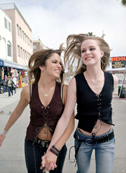
Movie Guru Rating:

Comment
on this review
| |

Portrait of teen rebellion is a warning to parents
by Joey Cody
When I saw The Ring, I swore off horror movies forever. But after becoming a mom and seeing Thirteen, I see that I'm going to have to expand my definition of the genre.
The heartwarming opening scene in Catherine Hardwicke's directorial debut has Tracy (Evan Rachel Wood) and her new best friend, Evie, high on whippets, punching each other in the face. Flashback to earlier in the year, when Tracy still had stuffed animals on her bed, smiley faces drawn on the toes of her tennis shoes, and affection for her mother and sweetly geeky friends. But at the beginning of seventh grade Tracy goes on a mission to reinvent herself and to curry favor with Evie, the most popular girl in school.
Evie (played by the film's co-writer, Nikki Reed) is outrageous in her nonchalance and sexual experience. She smells Tracy's desperation for approval like blood in the water and cruelly gives her an insincere invitation to go shopping, and a fake cell phone number. Tracy is tenacious, though, and soon the two are inseparable, bonding through shoplifting, truancy, and making out with older boys in the park.
A chronic corruptor and manipulator, Evie quickly insinuates herself into Tracy's household, supposedly to escape life with her negligent foster parent, Brooke. Evie's crocodile tears make it hard to tell exactly which of her tales of abuse are true—though it's not hard to believe that she has been mistreated in some way.
Tracy's mom, Melanie—a harried 12-stepper with a transient 12-stepping boyfriend—is either unable or unwilling to get her chaotic household under control. She does eight hairdos a day in her kitchen, lets friends drop by unannounced, and her absentee ex-husband refuses to help in any way but the most cursory.
As Melanie, Holly Hunter perfectly channels a mother barely hanging on to sobriety. But Mel's na�veté or denial is a bit implausible when she finally figures out her daughter's been lifting purses, has pierced her tongue, and is using drugs and having sex. She gapes in horror and is literally at a loss for words. While Tracy is practically begging her mother for boundaries and stability, Mel is committing a big no-no: wanting to be your daughter's best friend instead of her mother.
At one low point in her maternal nightmare, Mel actually allows herself to be backed up against the wall by Tracy, who lasciviously and maliciously taunts, "No bra, no panties. No bra, no panties...."
Hardwicke, who was production designer on Vanilla Sky and Three Kings, won the dramatic director's award at Sundance this year. She uses the cinema verite style to great effect here and you can almost smell her thrill at the coup of acquiring Reed's raw diary and the other great elements with which to build her film. Especially standout is Wood as Tracy: she expertly personifies an intoxicating cocktail of hormones, vivacity, and desire, and easily tosses out both smart-assed barbs and toddler-esque temper tantrums.
Reed, who wrote the semi-autobiographical screenplay along with Hardwicke, was the good-girl-gone-bad in real life, and here gets to play the teen vamp instead. Although convincing and sometimes shocking in her dramatic debut, she often appears detached, amusedly watching her story unfold onscreen.
As solid as the acting is, however, Thirteen is marred by a common Hollywood problem: It's hard to identify with Tracy, even if—like me—you were once a 13-year-old girl. Before her bad-girl transformation, she looks like a cross between Alicia Silverstone and Avril Lavigne—a beautiful young girl who's tall, blonde, willowy, creative, and smart. But she is like an average teen in that she no longer wants her mom to call her "baby," she doesn't want to be ignored at school anymore, and she most certainly doesn't want to be "pretty"—she wants to be a cool, drop-dead hottie.
Tracy does have a scarce and clueless father, but, for the most part, she's much-loved and well-cared-for. Her mom is sweet, hip, and hardworking, her house is comfortable, and her teachers admire her. Tracy—whose anger and frustration leads to surreptitious cutting—is clearly an atypical teen predisposed to excess and destruction—it just takes a fuse like Evie to inflame Tracy's inclinations.
Thirteen also can't quite decide whom to blame for all this teen pain and peer pressure: The media? Deadbeat dads? Ineffectual moms? Probably a mix, but it seems to place black hats on everyone except the girls themselves.
One thing is clear, though: alluring jailbaits oblivious to their budding sexual and marketing might are a thing of the past. Girls today are entirely aware of the power they wield, and have few qualms about working it. The scariest revelation for parents is that you'd better be prepared to deal with this shitstorm of rebellion and experimentation a lot sooner than you thought you'd have to.
Although it's a bracing antithesis to the glut of cotton-candy, Hilary Duff-y movies out there, Thirteen is less a snapshot of a typical girl's life and more like 1995's sensationalistic Kids—both after-school specials on meth.

September 18, 2003 * Vol. 13, No. 38
© 2000 Metro Pulse
|





